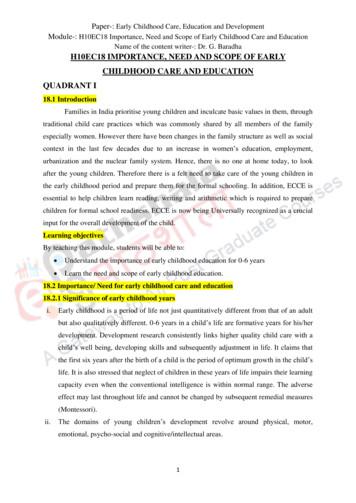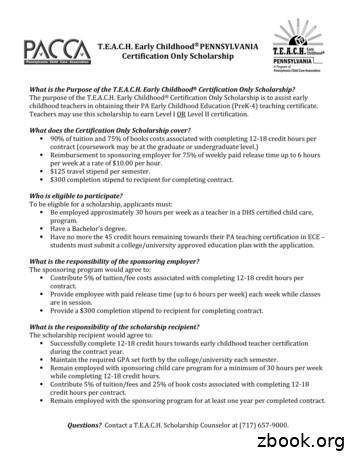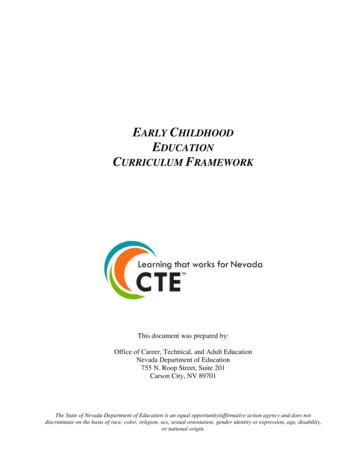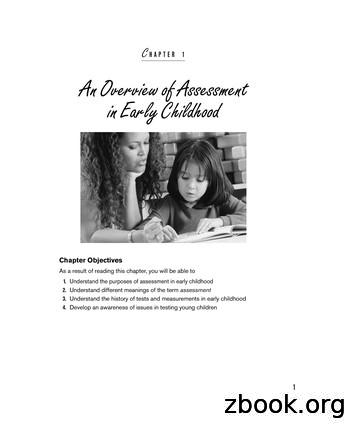Blueprint Deep Dive: Early Childhood Education
TO:Members of the State Board of EducationFROM:Mohammed ChoudhuryDATE:April 26, 2022SUBJECT:Blueprint Deep Dive: Early Childhood EducationPURPOSE:To brief the Board on early childhood programs and initiatives in the Blueprint for Maryland’s Future(HB-1300).EXECUTIVE SUMMARY:The presentation will include a discussion on early childhood education through four sections:1. Laying the Foundation2. Early Childhood Implementation in the Blueprint for Maryland’s Future3. Programs and Initiatives in Support of Early Childhood in the Blueprint4. Stabilizing and Rebuilding Maryland’s Child Care SystemIn this deep dive, five early childhood education themes from the Blueprint for Maryland’s Future willbe explored:1. Mixed-delivery Prekindergarten2. Program Quality3. Workforce4. Expanded Support Programs5. R4K Assessment SystemPrograms and initiatives in support of early childhood in the law will be discussed along with efforts tostabilize and rebuild Maryland’s child care system.ACTION:No action is required; this information is for discussion only.ATTACHMENTS: Maryland Ready: Maryland’s Path to School Readiness and Success Prenatal to Age 8 StrategicPlan 2020-2025 Blueprint for Maryland's Future: Prekindergarten Implementation Planning Maryland EXCELS March 2022 Data Sheet The Maryland Child Care Credential Program Booklet200 WEST BALTIMORE STREET BALTIMORE, MD 21201410-767-0100 410-333-6442 TTY/TDDMarylandPublicSchools.org
DIVISION OF EARLY CHILDHOOD, OFFICE OF TEACHING AND LEARNINGBlueprint Deep Dive:Early Childhood EducationMARYLAND STATE BOARD OF EDUCATIONPresented By Dr. Deann Collins, DeputySteven Hicks, Assistant SuperintendentApril 26, 2022
Blueprint Deep Dive: Early Childhood EducationPresentation Highlights Laying the Foundation Early Childhood Implementation in the Blueprint for Maryland’s Future Programs and Initiatives in Support of Early Childhood in the Blueprint Stabilizing and Rebuilding Maryland’s Child Care System2 Maryland State Board Of Education / Blueprint Deep Dive: Early Childhood Education04.26.2022
1. Maryland Ready:Maryland’s Path to SchoolReadiness and Success2. Pre-Blueprint Investments in EarlyChildhood Education3. Prekindergarten ImplementationPlanning – Legislative ReportLaying the FoundationImplementation Has Already Begun3 Maryland State Board Of Education / Blueprint Deep Dive: Early Childhood Education04.26.2022
Laying the FoundationMaryland Ready:Maryland’s Path to School Readiness and Success2020-2025 Prenatal to Age 8 Strategic PlanVisionMaryland’s vision is that all young children and their families will thrive.MissionMaryland promotes a well-coordinated and integrated system of programs, supports and services whereeach child has equitable access to high-quality early childhood experiences to develop a healthy body,healthy mind, and the foundational knowledge and skills needed to succeed, and where every family hasaccess to the resources needed to be effective as their child’s first and most important teacher andadvocate.Maryland Ready: ystem/files/filedepot/3/for release maryland ready- a path to school readiness and success 6.pdf4 Maryland State Board Of Education / Blueprint Deep Dive: Early Childhood Education04.26.2022
Laying the FoundationMaryland Ready:Maryland’s Path to School Readiness and SuccessSix Goals1. Strengthen availability and access by increasing availability and choice for all families and especiallyvulnerable families, decreasing barriers, serving more children with special needs in inclusivesettings, and improving coordination between early childhood education and health services.2. Improve and support program quality by increasing quality across sectors, focusing on equity,increasing kindergarten readiness for all children, and improving capacity to meet infants’ andchildren’s mental health needs.3. Deepen family engagement by increasing families’ awareness of high-quality programs, expanding2-generational programming, and enhancing families’ opportunities to engage.Maryland Ready: ystem/files/filedepot/3/for release maryland ready- a path to school readiness and success 6.pdf5 Maryland State Board Of Education / Blueprint Deep Dive: Early Childhood Education04.26.2022
Laying the FoundationMaryland Ready:Maryland’s Path to School Readiness and SuccessSix Goals4. Ensure successful transition experiences by strengthening institutional support for transitions,supporting families through transitions, and improving transition-focused professional developmentopportunities.5. Expand and enhance workforce development by improving professional development opportunities,strengthening equity, coordination and alignment efforts, and improving compensation for earlychildhood education professionals.6. Improve systems for infrastructure, data and resource management by improving coordinationacross agencies, modernizing the data system, using resources in ways that promote equity, andstreamlining funding mechanisms.Maryland Ready: ystem/files/filedepot/3/for release maryland ready- a path to school readiness and success 6.pdf6 Maryland State Board Of Education / Blueprint Deep Dive: Early Childhood Education04.26.2022
Laying the FoundationPre-Blueprint Investments in Early ChildhoodEducation 100 million in FY2021 and FY2022 Increasing programs and services for 3-year-olds and 4-year-olds in a mixed-delivery PreK system ofboth private providers and public schools with five school systems (Garrett, Kent, Somerset, andTalbot Counties and Baltimore City) offering universal PreK to all four-year-olds. Increasing the number of programs participating in Maryland EXCELS More teachers attaining higher degrees and credential program levels Expansion of Judy Centers and Patty Centers (Family Support Centers) Increased funding for Maryland Infants and Toddlers Program by 5 million Increased the number of school systems administering the KRA to all students from 18 districts to 21.Blueprint for Maryland’s Future legislation: ges/StateBill.aspx7 Maryland State Board Of Education / Blueprint Deep Dive: Early Childhood Education04.26.2022
Laying the FoundationPrekindergarten Implementation PlanningLegislative ReportComponentMSDE RecommendationIncome Verification ProcessIn FY 2023, continue current processes of income verification at the local level by program providers.MSDE developed a single application form.Administrative Procedures forDistribution of FundsMSDE will distribute the State Share of the PreK program directly to local school systems based onprior year enrollment. MSDE will distribute the State and Local Share of the PreK program fundingdirectly to eligible, participating private providers through a grant.Providing for Family PreferenceMSDE will provide the local school systems with the lists of eligible private providers within their schoolsystem boundary. MSDE will encourage local school systems to explore moving towards a unified orcommon enrollment system for PreK students.Calculating State, Local andFamily Share for Tier II ChildrenMSDE will select the option by July 1, 2022 for establishing the sliding scale based on input fromstakeholders and an evaluation of the projected impact.Prekindergarten SupplementalGrantMSDE recommends continuing the Prekindergarten Supplemental Grants in FY 2023 and FY 2024, anduse the funds to pay for full-day PreK for all enrolled 4 year old studentsBlueprint for Maryland's Future: Prekindergarten Implementation Planning: DE/ED5-229(h) 2021.pdf8 Maryland State Board Of Education / Blueprint Deep Dive: Early Childhood Education04.26.2022
1. Mixed-delivery Prekindergarten2. Program Quality3. Workforce4. Expanded Support Programs5. R4K Assessment SystemEarly Childhood Implementation inthe Blueprint for Maryland’s FutureAn Historic Investment in Early Childhood Education9 Maryland State Board Of Education / Blueprint Deep Dive: Early Childhood Education04.26.2022
Early Childhood Implementation in the Blueprint for Maryland’s Future1. Mixed-Delivery PreK Prekindergarten Expansion Grant Maryland State Prekindergarten Program2. Program Quality Maryland EXCELS Child Care Accreditation Support Fund Child Care Incentive Grant Program3. Workforce Maryland Child Care Credential Program Child Care Career and Professional Development Fund4. Expanded Support Programs5. R4K Assessment System10 Ulysses Currie Head Start State Supplemental GrantsMaryland Infants and Toddlers ProgramJudy CentersPatty Centers (Family Support Centers Kindergarten Readiness Assessment Ready for Kindergarten (R4K) GrantsMaryland State Board Of Education / Blueprint Deep Dive: Early Childhood Education04.26.2022
Early Childhood Implementation in the Blueprint for Maryland’s Future1. Mixed-Delivery PreKPrekindergarten Expansion Grants & Maryland State Prekindergarten pansion GrantsProgram§7-101.2Private and public providers may apply for a grant to provide fullday, high-quality prekindergarten for 3-year-olds and 4-yearolds from families with incomes at 300% FPL or below. Childrenwith disabilities and English learners are eligible regardless ofincome. There is no cost to the families nor the District.The FY2023 budgetincludes 26,644,000.Maryland StatePrekindergartenProgram§5-229§7-1A-01 to §7-1A-09This program provides funding to Districts based on prior yearenrollment of 3-year-olds and 4-year-olds in full-day, highquality prekindergarten. Private providers may apply for a grant.The FY2023 budgetincludes 144 million.Eligible ApplicantsPrivate andpublic providersGrantees receive 13,000per pupilPrivate and publicprovidersFunding begins at 10,094per pupil in FY2023 andrises to 19,526 per pupilby FY2030, with increasesfor inflation thereafter.Blueprint for Maryland’s Future legislation: ges/StateBill.aspx11 Maryland State Board Of Education / Blueprint Deep Dive: Early Childhood Education04.26.2022
Early Childhood Implementation in the Blueprint for Maryland’s Future1. Mixed Delivery PreKEligibility and Funding by Tiers I, II, and IIIEligibilityTier ITier IITier III3 or 4 years old4 years old4 years oldFamily income is less thanor equal to 300% of theFederal Poverty Level (FPL)Family income is more than300% but not more than600% of the FPLFamily income is more than600% of the FPLFamily chooses to enroll the Family chooses to enroll the Family chooses to enroll thechild in full–daychild in full–daychild in rgarten.Year ImplementedFY2023FY2025NAFunding ShareState/LocalState/Local/FamilyNo State ShareBlueprint for Maryland’s Future legislation: ges/StateBill.aspx12 Maryland State Board Of Education / Blueprint Deep Dive: Early Childhood Education04.26.2022
Early Childhood Implementation in the Blueprint for Maryland’s Future1. Mixed Delivery PreKA Goal of 50% of Slots in Private Provider Settings by the 2026-2027 School YearMSDE shall issue a waiver on the private provider percentage requirement if All families who desire to enroll eligible children with eligible providers are able to do so; or There are too few eligible private providers to meet the minimum requirements.School YearRequired Prekindergarten Slots Provided by Eligible Private 202645%2026-202750%After 2026-2027Minimum 50%Blueprint for Maryland’s Future legislation: ges/StateBill.aspx13 Maryland State Board Of Education / Blueprint Deep Dive: Early Childhood Education04.26.2022
Early Childhood Implementation in the Blueprint for Maryland’s Future1. Mixed Delivery PreKPrekindergarten Structural Elements– Phased-in by FY20261)2)3)4)5)6)High staff qualifications, including –a) Teachers who, at a minimum, hold:i.State certification for teaching in early childhood education; orii.A bachelor’s degree in any field and are pursuing residency through the Maryland ApprovedAlternative Preparation Program, which includes early childhood coursework, clinical practice,and evidence of pedagogical content knowledgeb) Teaching assistants who have at least:i.A Child Development Associate (CDA) certificate; orii.An associate’s degreeProfessional development for all staffA student–to–classroom personnel ratio of no more than 10 to 1 in each classClass sizes of no more than 20 students per classroomA full–day prekindergarten programInclusion of students with disabilities to ensure access to and full participation in all program opportunitiesMaryland PreK Grant Programs: aryland-prek-grant-programs14 Maryland State Board Of Education / Blueprint Deep Dive: Early Childhood Education04.26.2022
Early Childhood Implementation in the Blueprint for Maryland’s Future1. Mixed Delivery PreKPrekindergarten Structural Elements– Phased-in by FY20267) For at least 1 year before a student’s enrollment in kindergarten, learning environments that:a. Are aligned with State Early Learning and Development Standards;b. Use evidence–based curricula; andc. Use instruction methods that are:i. Developmentally appropriate; andii. Culturally and linguistically responsive;iii. Individualized accommodations and supports for all students;8) Instructional staff salaries and benefits that are comparable to the salaries and benefits of instructional staffemployed by the county board of the county in which the early learning program is located9) Program evaluation to ensure continuous program improvement10)On–site or accessible comprehensive services for students11)Community partnerships that promote access to comprehensive services for families of students12)Evidence–based health and safety standards13)Maryland EXCELS participation with a plan to achieve level 5 within five yearsMaryland PreK Grant Programs: aryland-prek-grant-programs15 Maryland State Board Of Education / Blueprint Deep Dive: Early Childhood Education04.26.2022
Early Childhood Implementation in the Blueprint for Maryland’s Future1. Mixed Delivery PreKMaryland Prekindergarten Program - Progression of Funding per PupilFiscal YearAmount Per PupilFY2023 10,094FY2024 11,594FY2025 13,003FY2026 14,473FY2027 15,598FY2028 16,811FY2029 18,118FY2030 19,526Subsequent Years The prior fiscal year increased by the inflation adjustment.Blueprint for Maryland’s Future legislation: ges/StateBill.aspx16 Maryland State Board Of Education / Blueprint Deep Dive: Early Childhood Education04.26.2022
Early Childhood Implementation in the Blueprint for Maryland’s Future1. Mixed Delivery PreKFull- and Half-day PreK Enrollment. Five School Systems Offer Full-day PreK to all 0182018-20192019-20202020-20212021-2022Maryland PreK Grant Programs: aryland-prek-grant-programs17 Maryland State Board Of Education / Blueprint Deep Dive: Early Childhood Education04.26.2022
Early Childhood Implementation in the Blueprint for Maryland’s Future1. Mixed Delivery PreKApproximately 25% of 4-year olds attend full-day PreK prior to ,0000KindergartenHalf-day PreK-3Half-day PreK-4Full-day PreK-3Full-day PreK-4*Includes publicly funded classrooms in public schools and community-based programs participating in the Prekindergarten Expansion Grants Program.18 Maryland State Board Of Education / Blueprint Deep Dive: Early Childhood Education04.26.2022
Early Childhood Implementation in the Blueprint for Maryland’s FutureQuestions & Comments19 Maryland State Board Of Education / Blueprint Deep Dive: Early Childhood Education04.26.2022
Early Childhood Implementation in the Blueprint for Maryland’s Future2. Program QualityMaryland EXCELS, Accreditation, and Incentive GrantsProgramDescriptionFundingEligible ApplicantsMaryland EXCELS is Maryland's quality rating and improvementsystem for child care, Head Start, and school-basedprekindergarten programs. The program helps child care andearly education programs increase and maintain quality andassists families in finding quality child care and early educationprograms.The FY2023 budgetincludes 5 million.Child CareAccreditation SupportFund§9.5-902The Child Care Accreditation Support Fund pays for theapplication fee for an approved accrediting organization onbehalf of a provider or reimburses a child care provider for aprogram improvement cost.The FY2023 budgetincludes 1 million.Licensed child care centersand registered family childcare home providers.Child Care IncentiveGrant Program§9.5-903The Child Care Incentive Grant Program supports improving thechild care provider’s quality through the purchase of approvedmaterials, equipment and supplies.The FY2023 budgetincludes 110,000.Licensed child careproviders and registeredfamily child care homeproviders.Maryland EXCELS§9.5-906, §9.5-907For FY2024 through 2028,funding for the programincreases by 10% over theprior fiscal year.For FY2024 through 2028,funding for the programincreases by 10% over theprior fiscal year.Licensed child care centers,Letters of Compliance,registered family child carehome providers, and afterschool programsBlueprint for Maryland’s Future legislation: ges/StateBill.aspx20 Maryland State Board Of Education / Blueprint Deep Dive: Early Childhood Education04.26.2022
Early Childhood Implementation in the Blueprint for Maryland’s Future2. Program QualityMaryland EXCELS: The State’s Quality Rating and Improvement System Since 2013, Maryland EXCELS (Excellence Counts in Early Learning and School-Age Care) has beenthe state’s quality rating and improvement system that awards ratings from Levels 1 to 5 to childcare and early education programs based on nationally-recognized standards and best practices. Quality Assurance Specialists work in every jurisdiction to support child care providers and Districts. Maryland EXCELS provides information that families need to make informed decisions whenchoosing child care and early education programs. Using a thorough but easy-to-understand rating system, Maryland EXCELS, sets a standard forincreasing the availability of high-quality child care and early education for children in Maryland. Prekindergarten programs receiving state funds and those accepting child care scholarships mustparticipate in Maryland s.org/child-care-providers/maryland-excels21 Maryland State Board Of Education / Blueprint Deep Dive: Early Childhood Education04.26.2022
Early Childhood Implementation in the Blueprint for Maryland’s Future2. Program QualityMaryland EXCELS: A Partnership with Johns Hopkins IDEALSMaryland EXCELS: https://marylandexcels.org/22 Maryland State Board Of Education / Blueprint Deep Dive: Early Childhood Education04.26.2022
Early Childhood Implementation in the Blueprint for Maryland’s Future2. Program QualityMaryland EXCELS Participating Child Care Programs StatewideSettingAll Licensed Child Care Programs66%Child Care Centers82%Family Child Care Homes57%Total Licensed Child CarePrograms7,135Percent ParticipatingParticipating Child CareCenters2,121Participating FamilyChild Care Homes2,588Participating Schoolbased Public PreK208Data as of March 2022: ata23 Maryland State Board Of Education / Blueprint Deep Dive: Early Childhood Education04.26.2022
Early Childhood Implementation in the Blueprint for Maryland’s Future2. Program QualityMaryland EXCELS Quality Rated Programs StatewideSettingChild Care Centers76%Family Child Care Homes50%Level 12,702Percent Quality RatedLevel 2361Level 3787Level 488Level 5408Total4,346Data as of March 2022: ata24 Maryland State Board Of Education / Blueprint Deep Dive: Early Childhood Education04.26.2022
Early Childhood Implementation in the Blueprint for Maryland’s Future2. Program QualitySupport for Programs to Reaching Higher Levels in Maryland EXCELS Each child care provider or school is assigned a Program Coordinator who reviews and ratessubmitted evidence. A Quality Assurance Specialist located in a Regional Child Care Office provides support. Programs have access to free approved professional development specific to understandingMaryland EXCELS standards, best practices, and strategies for increasing quality ratings. Free access is provided to online resources, including technology tutorials and the MarylandEXCELS Toolkit. Programs also have access to free Maryland EXCELS classroom assessment tools and CLASSassessments to support program chools.org/child-care-providers/maryland-excels25 Maryland State Board Of Education / Blueprint Deep Dive: Early Childhood Education04.26.2022
Early Childhood Implementation in the Blueprint for Maryland’s Future2. Program QualityMSDE and Johns Hopkins IDEALS Supporting Providers Together in Maryland EXCELS Quality Assurance Specialists (Maryland State Department of Education) Assistance with completing and submitting a Maryland EXCELS applicationSupport with the Maryland EXCLES system, standards, or evidenceProfessional development related to Maryland EXCELS standards and quality initiativesBeginning in Spring 2022, conduct Continuous Quality Improvement visitsConduct CLASS assessmentsProvide optional technical assistance for programs participating in Maryland Accreditation Program Coordinators (Johns Hopkins, IDEALS) Review and rate submitted evidenceProvide feedback about the standards, website, or the online systemManage expiring criteria/sub content org/child-care-providers/maryland-excels26 Maryland State Board Of Education / Blueprint Deep Dive: Early Childhood Education04.26.2022
Early Childhood Implementation in the Blueprint for Maryland’s Future2. Program QualityMaryland EXCELS Program Bonuses Funded in the BlueprintPrograms with a published rating of 1, 2, 3, 4, or 5 are eligible for Maryland EXCELS bonuses.QualityCenterRating Level nterLicensedCapacity100 Family Child LargeCare Home Family ChildCare Home1 50 100 150 50 502 250 500 750 150 2003 400 800 1,200 300 4004 1,000 2,000 3,000 500 8005 1,500 3,000 4,500 800 org/child-care-providers/maryland-excels27 Maryland State Board Of Education / Blueprint Deep Dive: Early Childhood Education04.26.2022
Early Childhood Implementation in the Blueprint for Maryland’s Future2. Program QualityMaryland EXCELS Differential PaymentIn addition to the program bonuses, programs with a published rating of 3, 4, or 5 andparticipating in the Child Care Scholarship program are eligible for differential payments,calculated as a percent of the child care scholarship.Level 3Level 4Level 5Under 2 years of age11%22%29%2 years of age and over10%21%28%Under 2 years of age22%37%44%2 years of age and over10%19%26%Family Child Care HomeChild Care .org/child-care-providers/maryland-excels28 Maryland State Board Of Education / Blueprint Deep Dive: Early Childhood Education04.26.2022
Early Childhood Implementation in the Blueprint for Maryland’s Future2. Program QualityChild Care Accreditation Support Fund - Supports for Maryland and National Accreditation Child care centers, registered family child care home providers, school-age only programs, andpublic prekindergarten programs receive assistance with the cost of Maryland Accreditation or11 national accreditations. The Accreditation Support Fund — National Accreditation assists licensed child care centersand registered family child care providers with required national accreditation fees for initialapplication, renewal application, and annual update. The Accreditation Support Fund – Maryland Accreditation assists licensed child care centerswith the cost of instructional materials associated with pursuing Maryland Accreditation. Develops standards that define quality policies and practices in program administration, programoperation, and home and community partnerships; andProvides technical assistance so programs can identify which areas need improvement to enhancethe program’s quality and ability to meet Maryland Accreditation and-accreditation29 Maryland State Board Of Education / Blueprint Deep Dive: Early Childhood Education04.26.2022
Early Childhood Implementation in the Blueprint for Maryland’s Future2. Program QualityChild Care Incentive Grant ProgramFunding is awarded to a child care provider for the purpose of improving quality of care throughthe purchase of approved: Materials;Equipment; hools.org/ccqig30 Maryland State Board Of Education / Blueprint Deep Dive: Early Childhood Education04.26.2022
Early Childhood Implementation in the Blueprint for Maryland’s FutureQuestions & Comments31 Maryland State Board Of Education / Blueprint Deep Dive: Early Childhood Education04.26.2022
Early Childhood Implementation in the Blueprint for Maryland’s Future3. WorkforceMaryland Child Care Credentialing Program & Child Care Career and Professional Development FundProgramDescriptionFundingMaryland Child CareCredential Program§9.5-904The Maryland Child Care Credential Program recognizesindividual child care providers who increase their qualificationsbeyond the requirements of state licensing and registrationregulations. Individuals may be awarded an achievement bonus,training reimbursement, or training voucher.Funding: Eligible Applicants:The FY2023 budgetincludes 5,170,000.Child Care Career andProfessionalDevelopment Fund(CCCPDF)§9.5-905The Child Care Career and Professional Development Fund(CCCPDF) is a tuition assistance program for child care providersto obtain a college education at participatingcolleges/universities in Maryland.No state funds have beenallocated.In FY2024, funding for theprogram increases by 10%over the prior fiscal year.Eligible ApplicantsRegistered family child carehome providers and childcare center staff.Registered family child carehome providers and childcare center staff who haveobtained at least a level 2in the Maryland Child CareCredential Program.Blueprint for Maryland’s Future legislation: ges/StateBill.aspx32 Maryland State Board Of Education / Blueprint Deep Dive: Early Childhood Education04.26.2022
Early Childhood Implementation in the Blueprint for Maryland’s Future3. WorkforceA Diverse Early Child Care WorkforceMSDE oversees multiple programs to support the early childhood workforce.The four major goals are to: Help develop a professional workforce qualified to provide care and education for young learners Improve the status and compensation for early childhood educators Recognize professional learning and ongoing education Provide a structure for .org/WorkforceAdvancementBranch33 Maryland State Board Of Education / Blueprint Deep Dive: Early Childhood Education04.26.2022
Early Childhood Implementation in the Blueprint for Maryland’s Future3. WorkforceMaryland Child Care Credentialing Program the Maryland Child Care Credential is a voluntary professional development career pathway thatrecognizes child care providers who go beyond the minimum requirements of State regulations. There are seven staff credential levels and four administrator credential levels, each one recognizinga child care provider’s achievement of a specified number of education and training clock hours,experience and professional activities. Participating providers are required to complete training in six Core of Knowledge areas that havebeen identified as essential knowledge to develop the skills and practices to provide the bestpossible care for the children and families they serve. Child care providers who are enrolled in the Credentialing program may receive bonuses rangingfrom 200 - ialing-branch/child-care-credential-program34 Maryland State Board Of Education / Blueprint Deep Dive: Early Childhood Education04.26.2022
Early Childhood Implementation in the Blueprint for Maryland’s Future3. WorkforceChild Care Career and Professional Development Fund The Child Care and Professional Development Fund (CCCPDF) is a is a tuition assistance programfor child care providers to obtain a college education at 23 participating colleges and universities inMaryland (9 universities and 14 community colleges). Funding is available for child care providers to earn a college degree in the following areas: Early Childhood Education Child Development Elementary Education Special dentialing-branch/child-care-credential-program35 Maryland State Board Of Education / Blueprint Deep Dive: Early Childhood Education04.26.2022
Early Childhood Implementation in the Blueprint for Maryland’s Future3. WorkforceSupporting a Pathway to SuccessChild
SUBJECT: Blueprint Deep Dive: Early Childhood Education . PURPOSE: To brief the Board on early childhood programs and initiatives in the Blueprint for Maryland's Future (HB-1300). EXECUTIVE SUMMARY: The presentation will include a discussion on early childhood education through four sections: 1. Laying the Foundation 2.
Understand the importance of early childhood education for 0-6 years Learn the need and scope of early childhood education. 18.2 Importance/ Need for early childhood care and education 18.2.1 Significance of early childhood years i. Early childhood is a period of life not just quantitatively different from that of an adult
T.E.A.C.H. Early Childhoodâ PENNSYLVANIA Certification Only Scholarship What is the Purpose of the T.E.A.C.H. Early Childhood Certification Only Scholarship? The purpose of the T.E.A.C.H. Early Childhood Certification Only Scholarship is to assist early childhood teachers in obtaining their PA Early Childhood Education (PreK-4) teaching certificate.
Early Childhood Education I L1 Early Childhood Education II L2 Early Childhood Education III L3C Early Childhood Education Advanced Studies AS The core course sequencing with the complementary courses provided in the following table serves as a guide to schools for their programs of study.
CHAPTER 1 An Overview of Assessment in Early Childhood Understanding Assessment in Infancy and Early Childhood Not too long ago, resources on early childhood assessment were limited to occa-sional articles in journals, chapters in textbooks on teaching in early childhood pro-grams, and a few small textbooks that were used as secondary texts in .
ECE 240 - Administration of Early Childhood Care and Education Programs (3) ECE 241 - Administration: Human Relations for Early Childhood Education (3) Colorado Mesa University B.A. Early Childhood Education - Early Childhood Special Education Advisor: Vail Shoultz-McCole vshoultz@coloradomesa.edu 970-255-2674
Early Childhood Care, Development and Education (ECCDE) is a term that is used interchangeably worldwide but refers to the same concept of early childhood education and cognitive development. The World Bank for instance refers to it as Early Childhood Care and Education, whereas UNESCO refers to it as Early Childhood Development Care.
Jun 29, 2021 · Suunto DX has four main modes: TIME, DIVE, PLANNING and MEMORY. Change modes by pressing [MODE] . Unless DIVE mode is turned off, Suunto DX automatically switches to DIVE mode if you are more than 1.2 m (4 ft) under water. DIVE PLAN MEM 12:001.12TH 12:001.12TH Time and dive modes have d
Certifications: American Board of Radiology Academic Rank: Professor of Radiology Interests: Virtual Colonoscopy (CT Colonography), CT Enterography, Crohn’s, GI Radiology, (CT/MRI), Reduced Radiation Dose CT, Radiology Informatics Abdominal Imaging Kumaresan Sandrasegaran, M.B., Ch.B. (Division Chair) Medical School: Godfrey Huggins School of Medicine, University of Zimbabwe Residency: Leeds .























